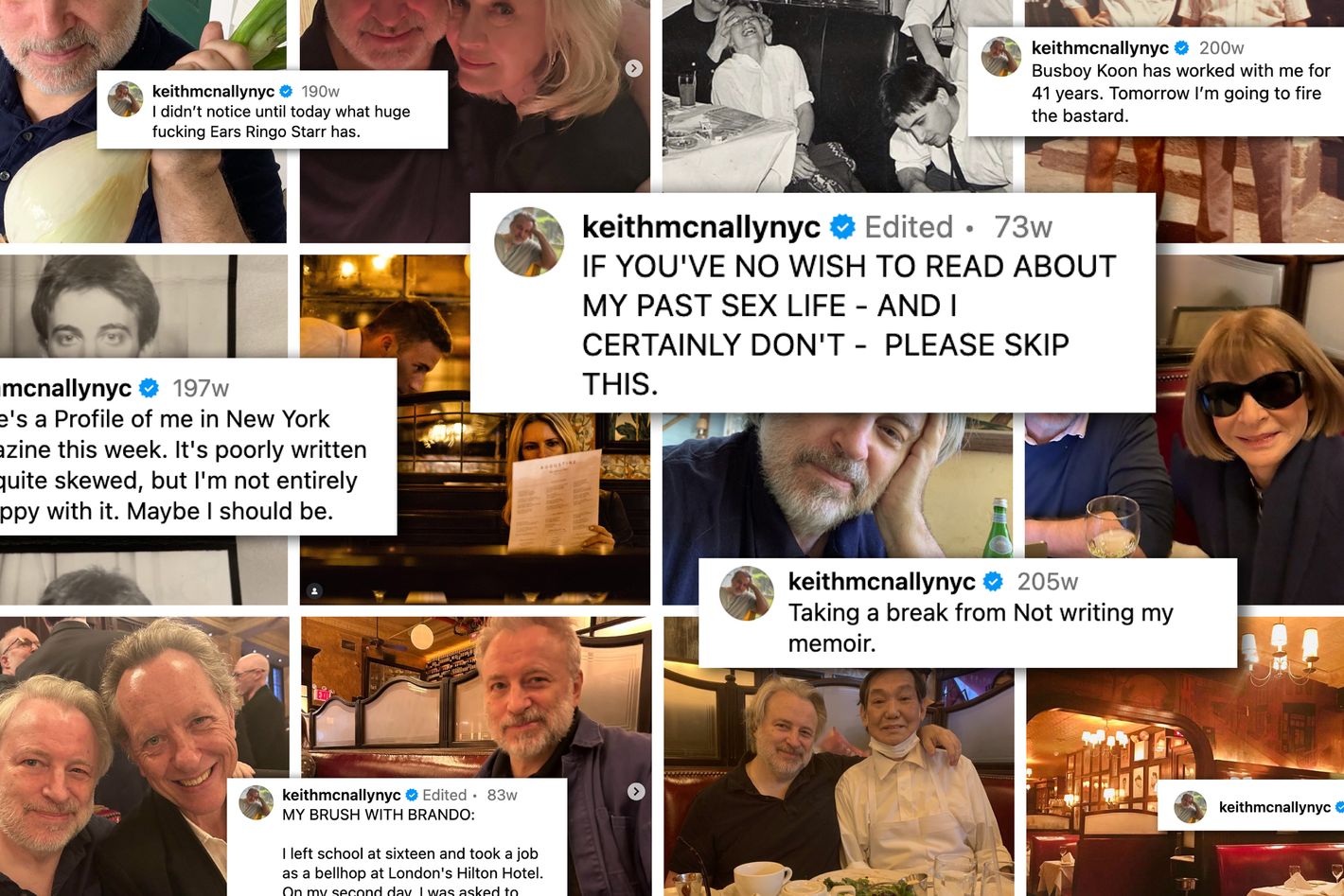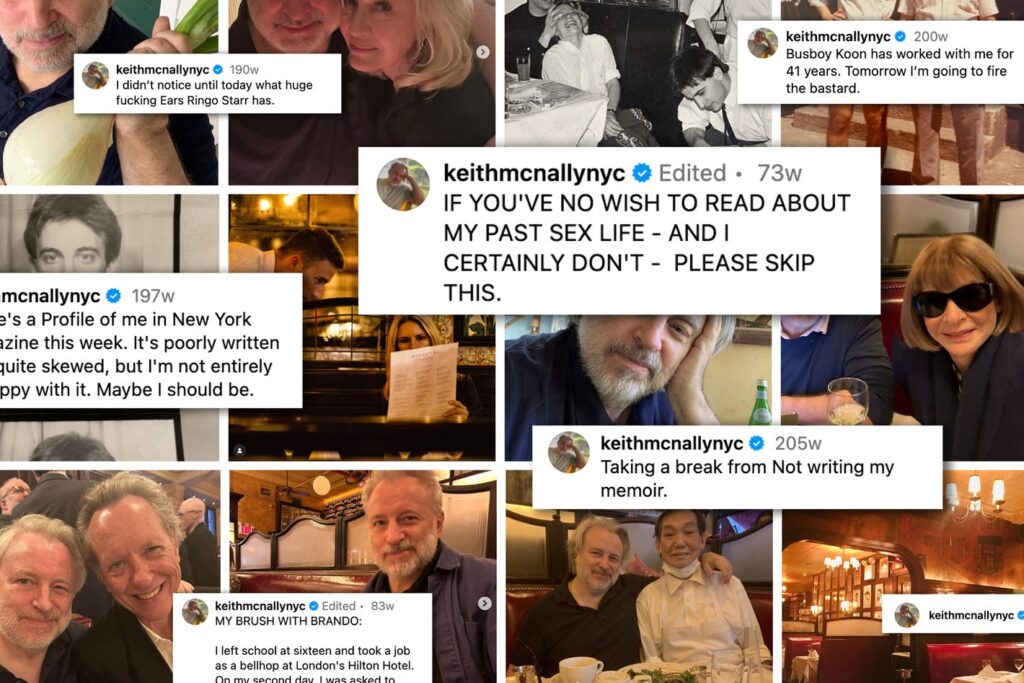
Keith McNally arrived on Instagram with a bone to pick. In his recent memoir, I Regret Almost Everything, the New York restaurateur describes his early days on the platform, writing, “Once I’d figured out how it worked, I was shocked by the fictitious lives people presented on Instagram. Almost everybody appeared to have perfect marriages and ‘bright’ kids, and to lead exceptionally undamaged lives.” McNally started his own account in part to “piss people off. To yank them off their high horses.” And he often does piss people off, speaking out in favor of maligned figures like Woody Allen, J.K. Rowling, and Kevin Spacey, or posting (and reposting) a photo of himself looking pleased in a hospital gown and mesh briefs after his vasectomy. Most notably — and likely the reason he is best known to people outside New York — McNally used his Instagram account to go in on then-late-night host James Corden in 2022 for being “the most abusive customer” to his Balthazar servers since the Soho restaurant opened in 1997. McNally banned Corden from Balthazar, only to un-ban him a few hours later, explaining on Instagram that “having fucked up myself more than most people, I strongly believe in second chances.” In his memoir, McNally explains that he “exaggerated” his outrage in an attempt to “seek the approval” of his young Balthazar staff. As his follower count skyrocketed, McNally found himself attracted to the lure of what he calls “gold coins” — not literal money but attention, followers, affirmation. “If this is the power of Instagram,” he writes, “I want no part of it. That’s what I’d like to say. But I can’t. I’m afraid the lure of gold coins is too much to resist.”
Despite McNally’s admission that he loves the attention he receives from causing drama on Instagram, he’s not a troll — at least not by any conventional measure. Where internet trolls often come off as flippant or spiteful, there is a relentless sense of play and mastery of language in even McNally’s most needling posts. He knows not to take any of this too seriously; the joke is on us if we take the bait. Most Instagram accounts belonging to celebrities or public figures seek to create an anodyne, uniform experience; people peddle in similar photo quality, regular fixtures, minimal opinion sharing (or exclusive opinion sharing built on a political consistency). “I’m normal,” this argues on behalf of some of our culture’s least normal people. McNally blows all of that up. He is a classic provocateur: It’s not enough that he is friends with Woody Allen but that he has to qualify him as “the innocent Woody Allen.” His defense is earnest, unvarnished. It’s irritating but authentic.
A McNally post can express just about anything — admiration, resentment, intimacy, frustration, or something in between — and that lends his Instagram an honesty otherwise unseen on the internet. His views are unpredictable: Despite his penchant for hobnobbing with the likes of Wintour or the odd Housewife, he has great disdain for the monarchy of England and Jeff Bezos. He’s got nothing to lose. So when he says he hates Love Actually, you believe him. Which is maybe why he sometimes lies. Just recently he shared a picture of himself with Diane Sawyer and detailed an affair he says they had in the 1970s. “Diane and I had a whirlwind love affair. It only lasted a week but we became best friends for life. Even though I’m really happy that we’re best friends I sometimes wonder what would have happened if we’d stayed together…” The tabloids went nuts, but he later told Mo Rocca that the story simply isn’t true. What is clear from this incessant Instagram posting is that McNally is simply happy to be here. Which here? His restaurants, New York, England — wherever. He is not concerned with brand building (his restaurants are doing fine) or glamor (he already has famous friends). What McNally does is use Instagram to do what he did long before he worked in restaurants — he tells stories.
McNally is certainly not the only person documenting New York, but he renders himself accessible in a way that other titans of art and culture do not. The 73-year-old has amassed a significant following on the platform from users that transcend his generation or even his time zone in part because his account feels not unlike any other page on the internet. You don’t need to care about or have gone to his restaurants, live in New York, or even know much about him to appreciate his online presence. Earlier this summer, McNally professed support for NYC mayoral candidate Zohran Mamdani, who he called “THE FUTURE” (caps his). A few days later, he posted a screenshot of another user’s Story. That post was itself a screenshot of McNally’s Mamdani endorsement on someone else’s Instagram Story, with the added text, “Balthazar I take back what I said about your mediocre beef tartare.” McNally took the joke in stride, writing in the caption that there was “at least one person left” in the city with a sense of humor. In a later post, a commenter derided McNally’s endorsement, writing, “Keith, educate yourself on his platform and how he views entrepreneurs like yourself. He’s not your friend.” McNally shot back: “I’ll decide who my friend is, you fucking moron.”
In tumultuous times, as institutions and figureheads crumble under the pressures and corruption of modern living, McNally appears to change with the tide of the city. His life in restaurants has brought him close to every kind of person imaginable — from his staff to tourists to regulars to his longtime celebrity pals. Working in hospitality has lent McNally an almost parental role: Here is an establishment who, perhaps, doesn’t completely disappoint. Or rather: Here is one who disappoints and reflects, grows and changes, clowns around, and moves on. In a single day, he’ll post photos from 30 years ago, four years ago, memes he found online ten minutes ago. I Regret Almost Everything is a deft memoir — as precise and interesting as McNally can be, detailing his early years as well as the years surrounding his 2018 stroke that radically altered his outlook on life — but a book is a polished artifact. People have to approve things; fact-checkers make their calls. McNally’s memoir is an impression of his life, but his Instagram is much more alive. Every time he posts about his Cotswolds house, which he lost in his divorce, he’s clear to showcase its beauty in the photo before adding in the caption that he never had sex there. On its face, there are few problems more Champagne than that, but McNally renders this fact with refreshing humility. “During the course of building my dream house I went broke, had a stroke, two of my restaurants went bust, and my wife left me. So the Moral of the story is… whenever you buy a new house please make sure you have Lots of fucking Sex in it.” Point taken.
He spouts urban legends with relish: Did he really meet Marlon Brando? John Belushi? Does it matter either way? Much of what feels wonderful and stupid about living in New York defies expectation. Through McNally’s Instagram, we witness shifting political tides, cultural frustration, the Barbie movie, city politics, gossip, and also the occasional picture of a burger. Like anyone foolish enough to buy into the myth of the city, he is outrageously self-possessed and frequently doubtful of what it is he does with himself. And what’s more, McNally has made it available to anyone who lives anywhere, warts and all.
In McNally’s Instagram, I’m reminded at times of the diary of Samuel Pepys, a 17th-century English naval administrator. That sounds unremarkable now in a landscape of public diaries, memories, and celebrities reading the audiobooks of their autobiographies, but Pepys was something of a groundbreaking force in the genre. He was not concerned with form or style — he was not a novelist, or even an aspiring one. He was mostly just a guy. But he wrote frequently and with great detail as to the goings on of his life: his work and his marriage; what food he ate and where he went. He confided in these pages about his affairs in lurid frankness, and as ostensibly “normal” as Pepys was, he lived through extraordinary times: fires, wars, political upheaval. Historians now look to Pepys’s diary as both an archival text and simply a funny read. An anecdote in which Pepys was forced by circumstance to defecate in a chimney doesn’t not feel like something McNally could one day cop to.
On February 20, 2020, McNally posted on Instagram for the first time: a photo of one of the waiters at the now-shuttered Financial District restaurant Augustine whose body disappears on the edge of the frame. In the caption, he quipped, “We only employ bodiless waiters.” In his multiple posts that day, his tone was straightforward and lighthearted. He captioned a photo of a highway in Florida with “the entrance to my driveway” — an unclear joke not expanded upon or otherwise acknowledged. That it doesn’t hit doesn’t matter much. An oddball post amusing to McNally and McNally alone became a kind of standard: Sometimes he’s just saying stuff to say stuff. That his account goes back to just before COVID is a glimpse at a life that feels very distant — February 2020 might as well have been 100 years ago. For McNally, it’s only about 6,000 and something posts.
Related
- What Keith McNally Is Listening To
- 8 New Books You Should Read This May
- ‘I Was 24 and Working Illegally’
The voracious Instagram poster has become a documentarian of New York in the 2020s — whether he likes it or not.































































